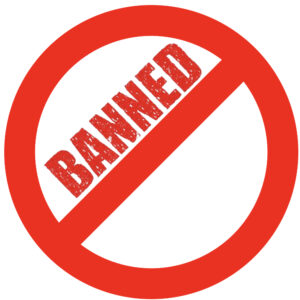Rather than do a long post this week, I’m going to send you all to a bunch of other web sites. Because it’s Banned Books Week in the U.S., and I don’t want to try to condense all this stuff into a single thousand-word essay. It’s too important.
Banned Books Week a week, once a year, when various organizations (particularly libraries) do things to draw attention to the number of attempts to remove—that is, to ban—books from the shelves of libraries in the U.S. (I think Canada does this as well, but I don’t know if it’s the same week.)
While a lot of the attempts—and successes—are in school libraries, public libraries also face book bans. National Public Radio has a nice three-minute interview with a librarian that sums up a lot of the issues here: https://www.npr.org/2024/09/24/nx-s1-5123542/banned-books-week-effort-to-document-and-highlight-support-of-the-freedom-to-read
The American Library Association started Banned Books Week in 1982. Their Banned Books Week website at https://www.ala.org/bbooks/banned has a lot of data on book-banning collected from reports by their member libraries. Pen America (the American branch of the international organization founded in London in 1921) has a different data set and methodology; their preliminary numbers for the 2023-2024 school year show over 10,000 book bans in the U.S.A. during that time. (https://pen.org/memo-on-school-book-bans-2023-2024-school-year/) They describe their methodology in their FAQ at https://pen.org/book-bans-frequently-asked-questions/.
Go read this stuff. Look up more. This is important for everyone and anyone who loves books, especially if you live in one of the states that is floating legislation to allow easier book-banning (see mentions in the PEN report, above).




Banned books week has become yet another nasty culture-war fight conflating the difference between “taxpayer money should not be spent on that book” and “people should not be allowed to read that book.” Worse, people’s brains melt and dribble out of their ears when books for (or not for) children are brought into it as a special case.
To use a “banned foods” analogy, it’s one thing to prohibit the production and sale of foie gras or rum cakes, and another to prohibit those foods from being bought with EBT cards or served in school cafeterias. And it’s dishonest to refer to the second sort of prohibition as “banning” those foods, especially when there’s a deliberate attempt to imply a prohibition of the first sort.
For many people, if a book isn’t available in a public library then it isn’t available at all. Books, especially hardbacks, are expensive. I used to order books for the library where I worked. They were expensive then, and more so now.
I certainly ordered books that I didn’t agree with; our clientele asked for them, and we bought them. If we say that taxpayer money shouldn’t be spent on books that offend anyone, then we are left with the blandest of the bland, and a grossly distorted image of what our world looks like today.
Here’s my issue with book bans: Whether I like or dislike a book that has been banned, and even if I would never read it anyway, I honestly resent having the choice to read it or not as I wish taken from me. How are people supposed to figure out what they like and dislike, what ideas they agree with or don’t agree with, if they never have the option to explore those things? And what better way to explore a topic than through a book (or two, or ten)? Politics, please don’t take my options and choices from me. Let books be.